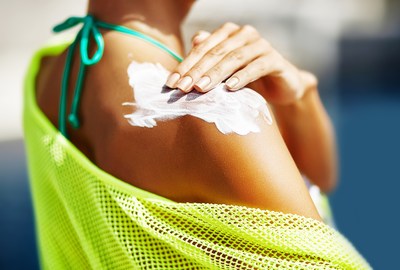NEW YORK, Feb. 28, 2020 /PRNewswire/ -- Dr. Dennis Gross, a New York City board-certified dermatologist with a background in skin cancer research, released a statement citing concerns after a new study published by the Food and Drug Administration (FDA) showed six common chemical sunscreen ingredients absorb into the bloodstream and greatly exceed levels considered safe.

The study published in the prestigious Journal of the American Medical Association shows that all six chemical sunscreen ingredients exceeded the safe level of 0.5ng/mL in the bloodstream after just one application. One ingredient – oxybenzone – showed an absorption rate 188 times the safe level after one application. After 4 applications, absorption increased 500 times the safe level. All chemicals stayed elevated in the blood anywhere from one to 21 days, depending on the chemical sunscreen ingredient.
The study also reports that these ingredients can make their way into woman's breast milk and cause endocrine hormonal disturbances. They lack nonclinical safety data regarding whether they are carcinogens and harm developing children.
Because of this, the FDA itself concluded that additional testing is necessary to determine whether these ingredients are generally recognized as safe.
"The results of this study are alarming," Dr. Gross says. "So, what should we do with this information? We know sunscreen prevents skin cancer – we need them. To me, the answer is simple. Play it safe. Use the physical sunscreens and not the chemical sunscreens."
There are two categories of sunscreen filters: physical (also known as mineral) and chemical. All physical sunscreens use titanium dioxide and zinc oxide which sit on the skin's surface, acting as a shield. Chemical sunscreen ingredients such as oxybenzone, avobenzone and octocrylene work by absorbing UV rays instead of blocking them and have been shown to be absorbed into the bloodstream.
"Sunscreen is important to protect against skin cancer, and you should not stop using it. But, given this alarming information, physical sunscreens are a safer choice," Dr. Gross says. "This is why I tell my patients, family and friends to only use physical blocks. Sunscreen is important but the physical blocks are a safer choice."
ABOUT DR. DENNIS GROSS:
Board-certified dermatologist and dermatological surgeon Dennis Gross, M.D., founded his practice in 1990 after completing his residency at the New York University Medical Center, where he earned a medical degree with research distinctions. With a deep interest in skin that is healthy as well as beautiful, Dr. Gross has executed extensive research at prestigious institutes, including Memorial Sloan-Kettering, on melanoma. His research on skin cancer has been published in multiple peer-reviewed journals, including Journal of Experimental Medicine and Journal of Medical Microbiology. Dr. Gross serves the Skin Cancer Foundation and is an active member of the American Cancer Society, as well as the American Academy of Dermatology, the Society for Dermatological Surgery and Oncology, the American Medical Association, and the New York Dermatology Society.
Media Contact: Alyssa Keller, (646) 747-5643, alyssa.keller@dgskincare.com
SOURCE Dr. Dennis Gross, M.D.
© 2024 Benzinga.com. Benzinga does not provide investment advice. All rights reserved.
Trade confidently with insights and alerts from analyst ratings, free reports and breaking news that affects the stocks you care about.